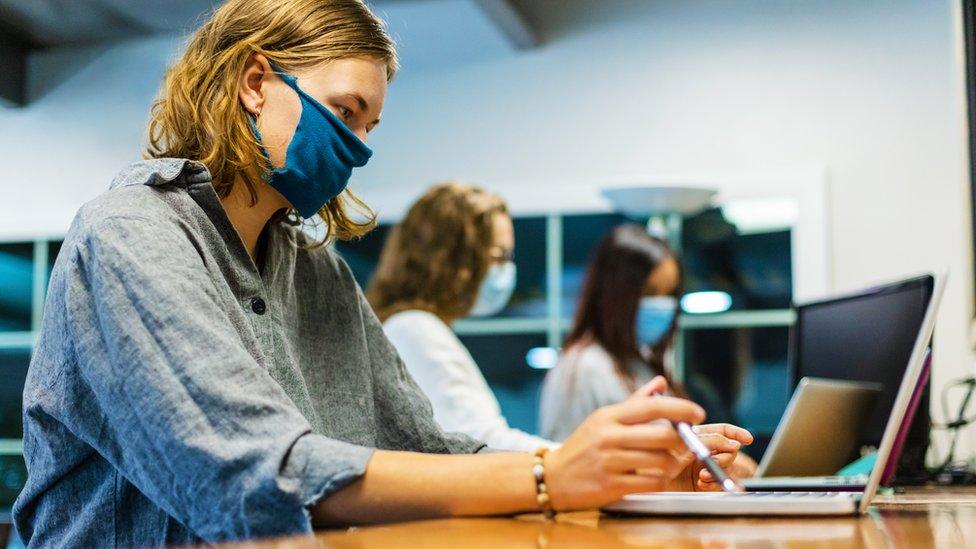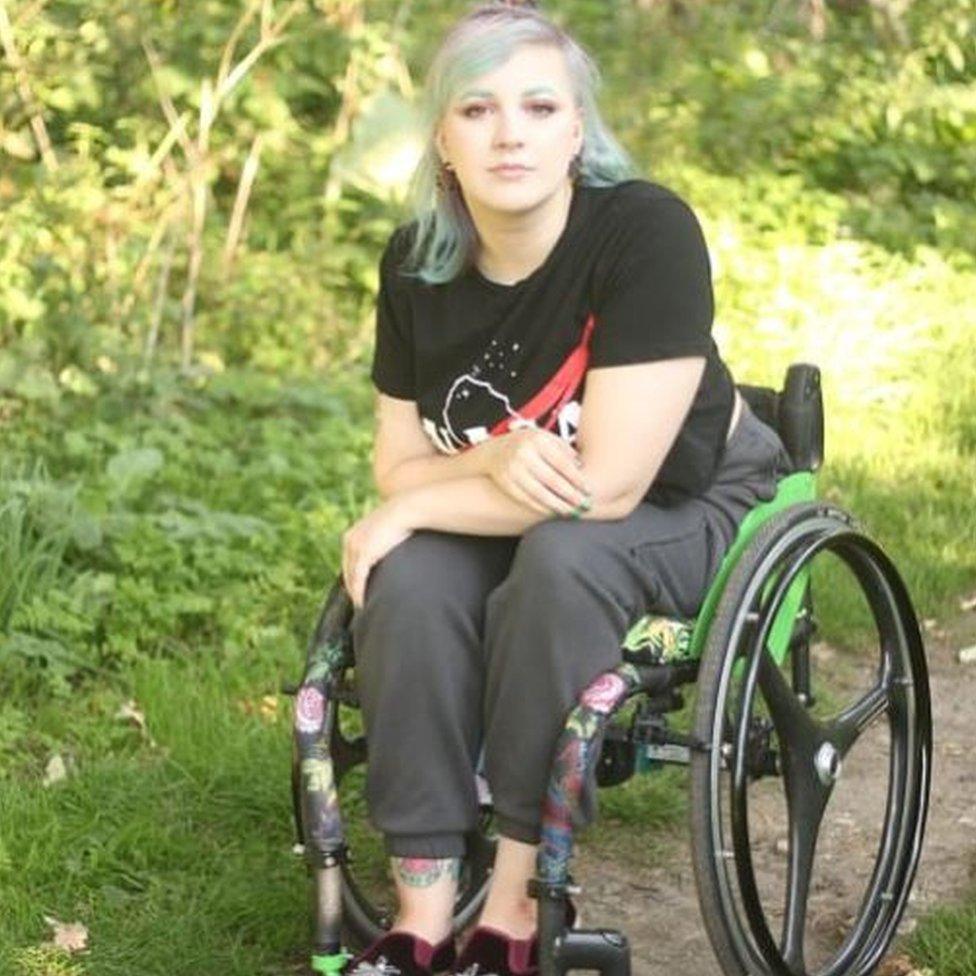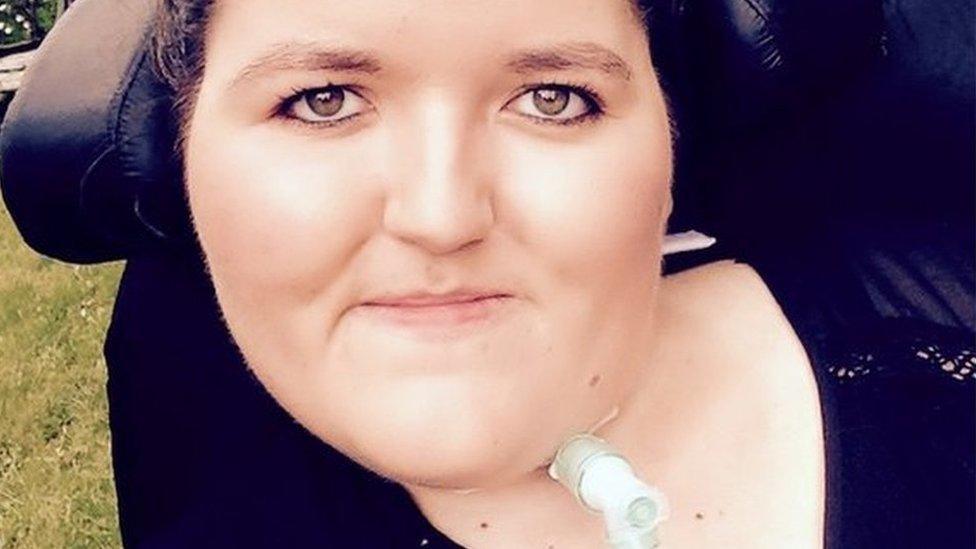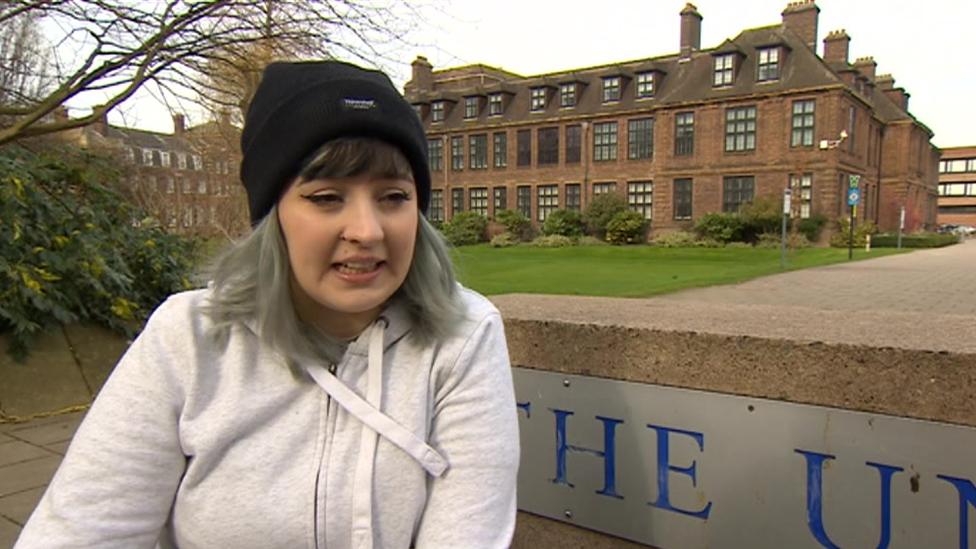Coronavirus: Are disabled uni students getting enough help?
- Published

"Muffled voices" being difficult to hear during online lectures and a lack of alternative teaching materials made available have been among the complaints voiced by disabled university students trying to cope with adapted ways of studying during the coronavirus pandemic.
According to a recent National Union of Students survey, external of more than 4,000 university students in the UK, 27% said they were unable to access online learning during lockdown and 18% said they lacked the support necessary to deal with the pandemic.
Disability Rights UK said its disabled student helpline had received hundreds of calls from people across the UK who said slides, reading lists and handouts were not always made available in advance of teaching sessions.
Students with autism spectrum disorder and mental health impairments had also reported concerns with online conferencing, including the "high degree of multi-tasking involved", such as the simultaneous use of video, audio and whiteboard.
There had also been "varying success" depending on microphone quality, accents and bandwidth, particularly for deaf students.
The Office of Students has been producing a series of briefing notes on the steps universities and colleges have taken to support their disabled students, external during Covid-19.
It has highlighted several universities that seem to have adapted well to the situation, including the University of Wolverhampton where each deaf student has a dedicated interpreter and can video call using sign language, and the University of Bath where equipment and software can be supplied to students at home during exams and assessments.
But has enough been done and what have the students said?

'Voices were muffled and obscured by background noises'

"Just one day of teaching was enough to make me realise the university was not providing for deaf and hard of hearing students adequately," said University of Manchester student, Madeleine Webster-Harris, who is severely deaf.
The 20-year-old from Dorchester, Dorset, who is in her third year of an integrated masters of biology course, said the sound quality of online lectures was "very low" and "lecturers' voices were muffled and obscured by background noises".
"I tried to rectify this by using the available subtitles and transcripts, however... words were both translated and spelt incorrectly making the information incomprehensible.
"Despite this extremely reduced quality of teaching, we are still paying full tuition fees, so I do not believe it is unreasonable for us to demand better resources and support during this time."
The University of Manchester said it would not comment on individual cases but added it was "fully committed" to providing support to all of its disabled students, with "tailored assistance for their individual requirements".
Throughout the pandemic, the university said the feedback it had received had suggested there had been a "positive experience for many of our disabled students".
"However, we do recognise that different students have different needs, and we know there are always areas we can improve and that is something the university is consistently working towards," it added.

'I left because I didn't feel safe but I don't blame the university'

"I have a team of people supporting me, so I have to take extra precautions," said Keron Day, a first year human geography student at the University of Exeter.
The 19-year-old, who has cerebral palsy and is a wheelchair user, said he "did not feel safe" on campus so he returned home to Helston in Cornwall and has been learning remotely since September.
"If any of my support team gets Covid-19, it makes the care side of my life very difficult," he said.
"I think there's been a rush to get students back without necessarily considering entirely what it's like to be more vulnerable, but I don't blame the university.
"In terms of the support I have been getting, I think it's been very good. I have been in regular contact with my tutor about my work and well-being - both physical and mental health.
"I don't think they could have done any more for me."
The University of Exeter said it was "committed to inclusion and success for all" and would continue to support Mr Day's online learning until he was able to return to campus.

'Students with disabilities are an absolute after-thought'

"Our needs are still being ignored," said Sarah-Marie Da Silva, who is a wheelchair user.
The second-year zoology student and disability rep at the University of Hull previously described its lack of disabled access as "humiliating".
Although remote-learning has made her life easier, as she had no stairs to negotiate, she said disabled students remained "an absolute after-thought".
She said some students with dyslexia "who need longer to process information" were being provided with material online and expected to print it off in their own time and sometimes at their own expense if library printers were busy.
The 22-year-old, from Bedford, said lecturers had also refused to record lessons for remote learning for fear of copyright issues and "people stealing their ideas", which she described as ridiculous.
The University of Hull said it was "fully committed to providing an inclusive student experience and to addressing any difficulties that our students may be facing".
It said students with learning difficulties who received Disabled Students' Allowance (DSA) funding, were provided with a personal printer and help with printing costs.
"There was an issue in the past among a very small number of lecturers who had security, diligence and copyright concerns - such as posting research-led teaching content online before the research was officially published," the university said.
However, it added it was not aware of any lecturer having refused to make content available in an alternative format when required for accessibility.

"Living with a disability should never hold people back from entering and succeeding within higher education," the Department for Education said.
"With most institutions offering a blend of in-person and online teaching this term, we expect universities to fulfil their commitments to the Equality Act and respond flexibly to any changed needs disabled students may have to ensure they can continue to receive a high-quality education."
It also said the DSA had helped to "break down barriers" by providing grants to help students with any extra study costs.

A SIMPLE GUIDE: How do I protect myself?
AVOIDING CONTACT: The rules on self-isolation and exercise
LOOK-UP TOOL: Check cases in your area
MAPS AND CHARTS: Visual guide to the outbreak

- Published4 July 2020

- Published2 June 2020

- Published14 February 2020
